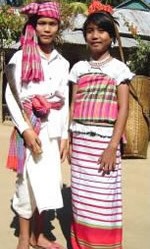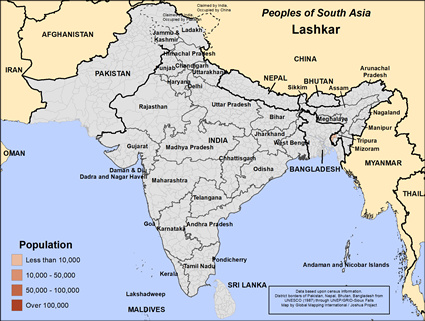Lashkar in India

Photo Source:
Rev. T. Kampu
|

Map Source:
People Group data: Omid. Map geography: UNESCO / GMI. Map Design: Joshua Project
|
| People Name: | Lashkar |
| Country: | India |
| 10/40 Window: | Yes |
| Population: | 900 |
| World Population: | 900 |
| Primary Language: | Bengali |
| Primary Religion: | Hinduism |
| Christian Adherents: | 0.00 % |
| Evangelicals: | 0.00 % |
| Scripture: | Complete Bible |
| Ministry Resources: | Yes |
| Jesus Film: | Yes |
| Audio Recordings: | Yes |
| People Cluster: | South Asia Hindu - other |
| Affinity Bloc: | South Asian Peoples |
| Progress Level: |
|
Introduction / History
The Hindu Lanskar people in India have a background primarily connected to agriculture and traditional crafts. They live near the border between India and Bangladesh and speak Bengali. Since they are Hindus, they probably speak the Hindu dialect rather than Bangladesh's Muslim Bengali dialect.
What Are Their Lives Like?
The Lanskar people live in rural villages and small towns, focusing on farming and small-scale craftsmanship. They grow crops such as wheat, rice and vegetables. Many also engage in weaving, pottery and other artisanal crafts. Their diet includes both vegetarian and non-vegetarian food, featuring staples like rice, lentils, vegetables and meat. Traditional dishes such as dal (lentil soup) and roti (flatbread) are common in their meals.
Weddings among the Lanskar are elaborate, involving rituals like the exchange of garlands, sacred fire ceremonies, and celebrations with traditional music and dance. Their communities emphasize strong family bonds and mutual support.
What Are Their Beliefs?
The Lanskar people practice Hinduism, worshiping various deities and observing numerous religious rituals and festivals such as Diwali, Holi and Navratri. Their belief system emphasizes values like dharma (duty), karma (actions and consequences), and ahimsa (non-violence). They honor their ancestors through rituals and ceremonies, ensuring the continuation of their traditions across generations.
What Are Their Needs?
The Lanskar people need better access to quality education to provide more opportunities for their children. Improved healthcare services are essential due to the limited availability of medical facilities and high rates of preventable diseases. Economic support through modern agricultural techniques, market access, and vocational training can enhance their livelihoods. Infrastructure development, including better roads, clean water supplies, and reliable electricity, will greatly benefit the Lanskar community. Addressing these needs will help the Lanskar people achieve greater socio-economic stability while preserving their way of life.
Prayer Points
Cultural Traditions of India, Ministry of Culture, Government of India, 2017.
Sharma, B.K., "Agricultural Practices in India," Mittal Publications, 2012.
"Rural Development in India," Ministry of Rural Development, Government of India, 2018.